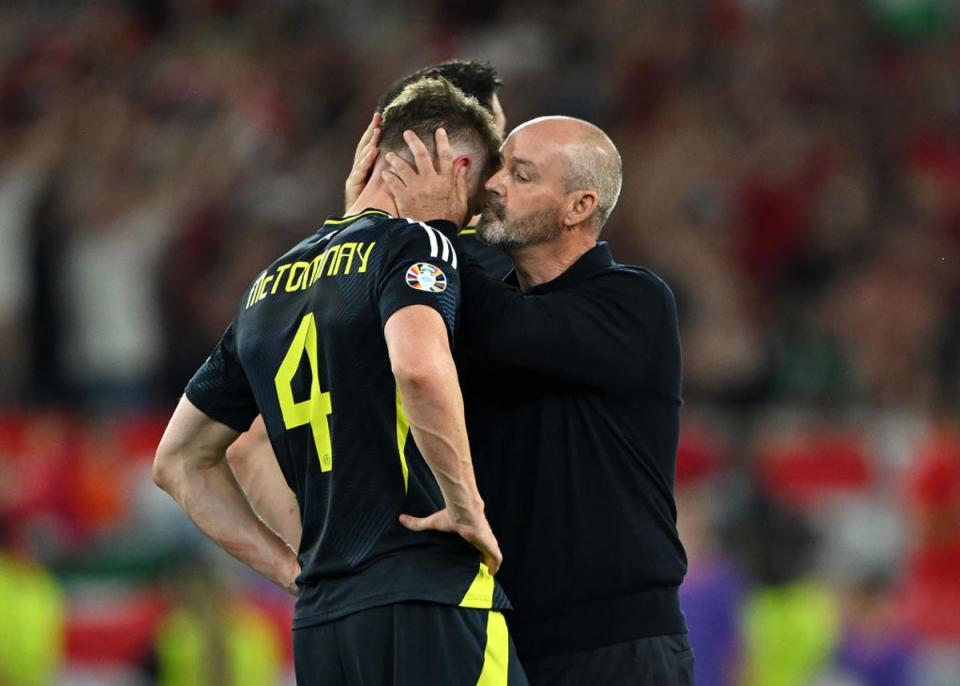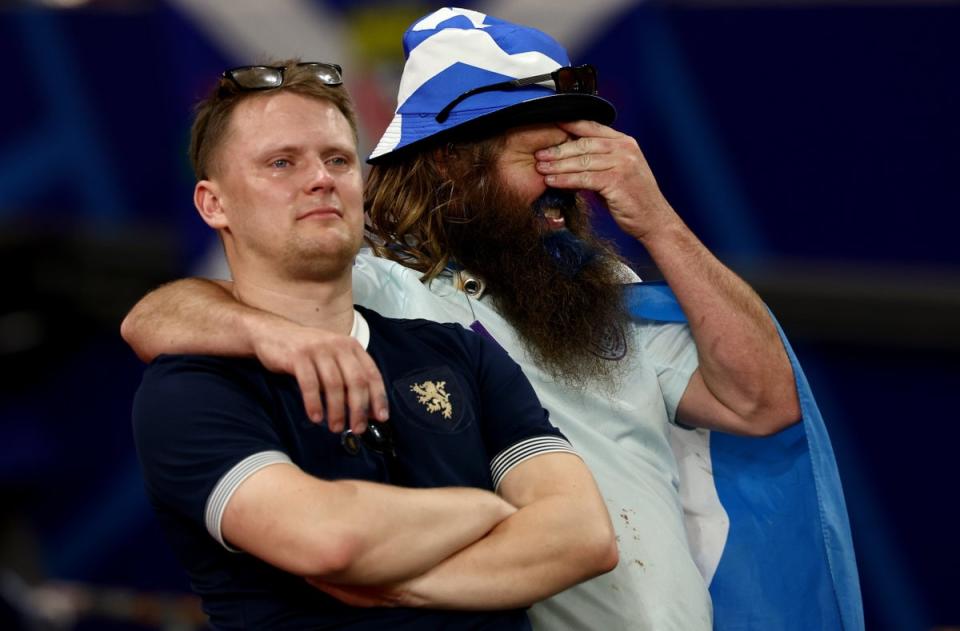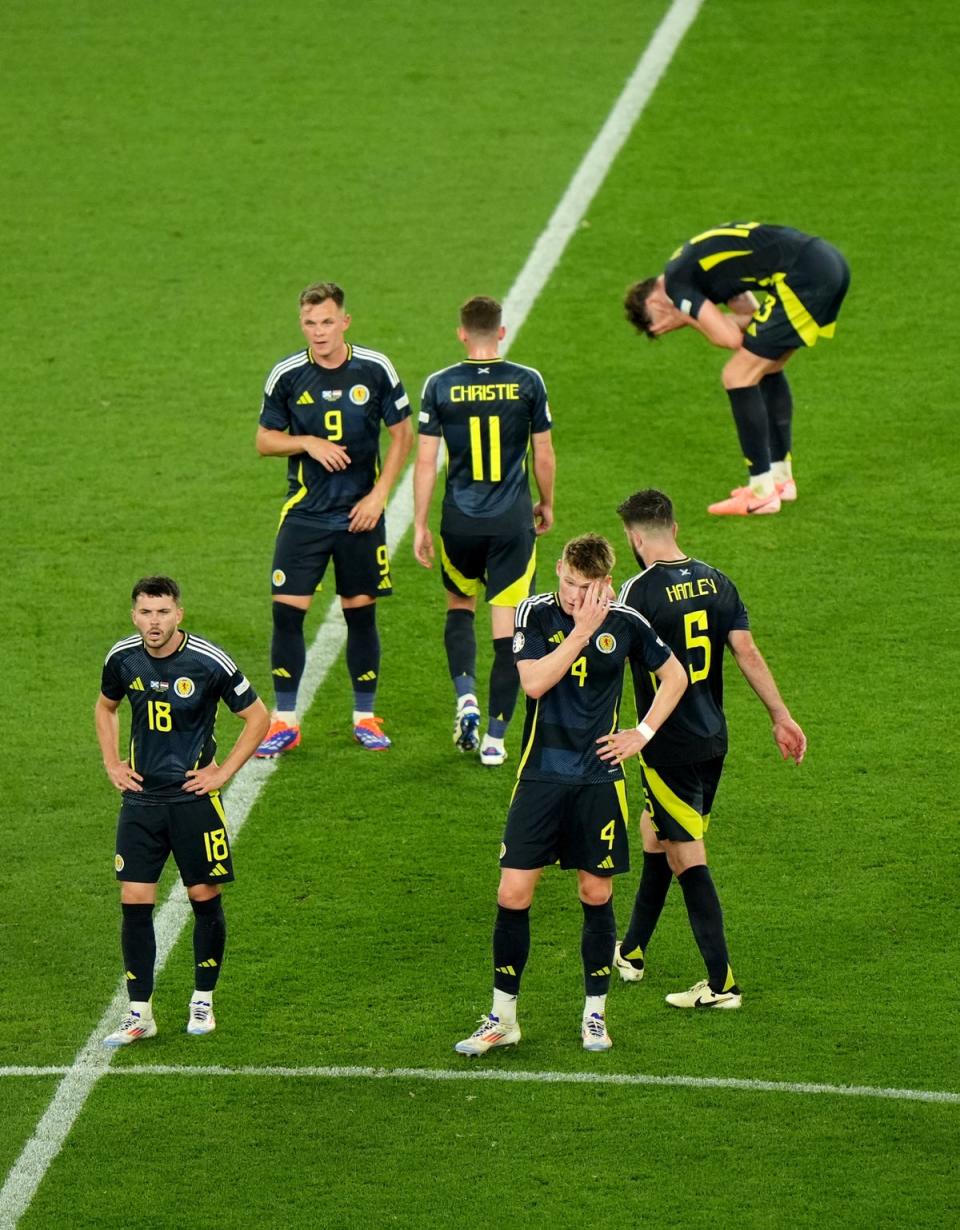The brutal truth behind Scotland’s Euro 2024 heartbreak
At least Steve Clarke could point to progress, of sorts. “We scored two goals this time, we only scored one the last time,” said Clarke, as the Scotland manager reflected on another group stage exit from a major tournament. However, it summed up Scotland’s lack of cutting edge at Euro 2024 that the two goals they did score went in off opposition players, in Antonio Rudiger’s own goal and Fabian Schar deflecting Scott McTominay’s shot past his goalkeeper.
If hosts Germany and Euro 2024 will miss the Tartan Army and the atmosphere the travelling fans brought to the tournament, the same cannot be said of Scotland on the pitch. If three games brought one point and an early exit, the same as three years ago at Euro 2020, Scotland can hardly pretend to be hard done by. Their 17 shots at Euro 2024 is the joint-lowest ever recorded in a group stage – only Northern Ireland, in 2016, showed less attacking threat and even they managed what Scotland could not and reached the knockouts.
And so the fear before the tournament that Scotland did not have enough goals in the side proved correct, as an absence of creativity and attacking ambition became brutally apparent. In a must-win game against Hungary, Scotland failed to have a shot until the hour. Holding out for one moment – in this case, appealing for a penalty as Stuart Armstrong went to ground in the box along with Hungary’s Willi Orban – was a gamble Clarke took. And it explained Scotland’s passive start. “It was a one-goal game,” he said. For him, it hinged on a “100 per cent” penalty.
Yet Scotland barely mustered enough chances for one goal across three games. An xG of 0.9 is the lowest of all sides at Euro 2024, the three efforts they managed on target is indicative of a lack of ideas and imagination. If Scotland’s past at major tournaments carries a history of nearly-moments, glorious failure this was not. In the Group A decider, Scotland’s best moments were Armstrong’s appeals and a couple of late glimpses that fell in the Hungary box. There was the heartbreak of Kevin Csoboth’s 100th minute winner but it’s unlikely two points would have been enough anyway.
Clarke will face criticism for not affording more of an opportunity to Lawrence Shankland, the 30-goal Hearts striker who saw just 25 minutes off the bench at the tournament. Scotland’s blunt attack was not helped by John McGinn having a poor Euros. McGinn is the top scorer in the squad with 18 but has not found the net for his country since November and was brought off by Clarke with Scotland needing a winner. Scott McTominay was the hero in qualifying and produced the opener against Switzerland, but “own goal” has been Scotland’s top scorer in 2024.
Perhaps McTominay’s seven goals in qualifying covered underlying faults, with the midfielder’s return proving unsustainable in the long run. Scotland needed more. “We had a lot of the ball and we didn’t create enough, but we created enough to score a goal,” Clarke said. “Is that why we’re out of the tournament? Well, we scored two goals this time, we only scored one the last time. It’s something for me to go away and think about, speak to my coaches and try to work on something going into the future on how we can score more goals at certain times in the game.”

But this is also an issue that goes above Clarke and beyond tactics. Could Clarke set up his side any differently, given the lack of options at his disposal? When QPR forward Lyndon Dykes was ruled out of the Euros, Clarke’s alternatives were limited to calling up an uncapped Bristol City forward in Tommy Conway and winger Lewis Morgan, who was not on anyone’s radar at New York Red Bulls. That Ben Doak, the 18-year-old winger with just a smattering of appearances for Liverpool, was close to making the squad despite not being fit shows how short Clarke’s list was.

Scotland are not the only nation at Euro 2024 to be lacking a leading forward and goalscorer, but they were found to be woefully short of pace and ingenuity. Scotland showed character in the manner they bounced back against Switzerland, following the opening 5-1 defeat to Germany, but that can only get you so far. At international tournaments, contenders are defined by their weaknesses as much as their strengths and Scotland’s quality is spread too thinly among the team, with too many gaps to overcome.
It is a question that will need to go back to the Scottish Football Association, with the lack of new talent coming through an issue that has been covered up by Scotland’s recent successes in qualifying. Scotland had the second-oldest squad at Euro 2024 with an average age of 28.3, and after a run of just one win in 12 matches it is becoming increasingly clear that this generation may have peaked 12 months ago.

If Clarke brought the good times back to Scotland with successive appearances at major tournaments, their subsequent performances have only gone to show how far there still is to go.

 Yahoo Sports
Yahoo Sports 
